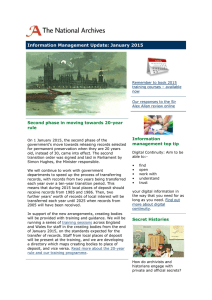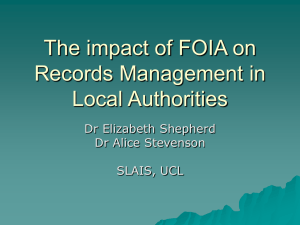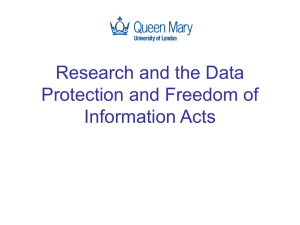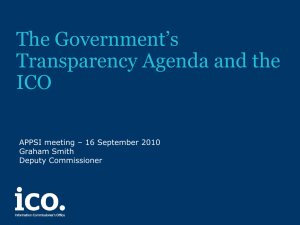The impact of FOIA on Records Management in Local Authorities Dr Elizabeth Shepherd
advertisement
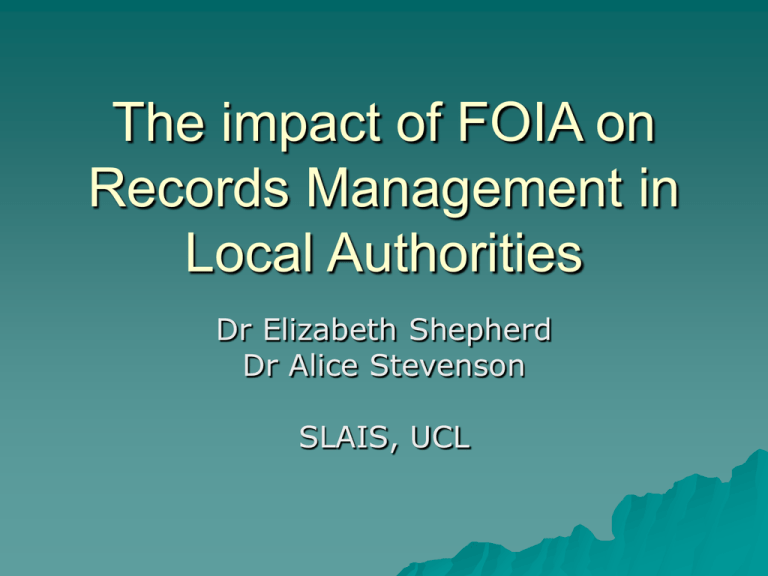
The impact of FOIA on Records Management in Local Authorities Dr Elizabeth Shepherd Dr Alice Stevenson SLAIS, UCL Research project Funded by the Arts and Humanities Research Council for a year, 2008-09 What has been the impact of the FOIA on records management in public authorities, especially local government, in the UK? three perspectives: records managers, FOI policy managers, FOI requestors and user communities Research Objectives how well records management services prepared for and coped with the first three years of FOI implementation what contribution records management services make to the ability of public authorities to comply with the FOI Act how the user experience of FOI is affected by the management of records what the implications are of FOI so far for good practice in records management. Background Amos et al. 2008. FOI 2000 and local government in 2007: The experience of local authorities in England. London: Constitution Unit, UCL. Background Amos et al. 2008. FOI 2000 and local government in 2007: The experience of local authorities in England. London: Constitution Unit, UCL. Research method Data collection: 22 semi-structured interviews with officers responsible for FOI and/or records management in local authorities in London and south east of England (county, unitary, city and London borough) Two focus groups with requestors Data analysis using NVIVO 7 Understanding the Context Position of RM and FOI in the organisation relative to each other. Roles and responsibilities: electronic vs paper. Departmental perception of RM and FOI. Understanding the Context E-government and technology Data security Organisation of employment Space/Accommodation Business efficiency Interpreting the impact – “It’s more high profile, but the actual way we do things hasn’t changed” – “It’s probably made awareness of RM. You go round and people realize there’s a need, but it’s just there’s never enough time or money to actually get good RM in lots of teams.” – “AS: So there hasn’t been much change in RM as a result of FOI in this council? X: There has been a change in so far as we have brought in training and raised awareness” - “I mean what’s changed is the intention to address that I think and to do so on a corporate basis” Nature of requests “FOI requests in [the council] at the moment, tend to be to do with stuff that is actually active now or within the last financial and that is the sort of stuff which hasn’t even got to the stage where it’s in a RM sphere” Knowledge Management – “a lot is not stored in a records management document manager. It is still stored on servers that are unique to each directorate or unit or service so we have to chase humans to get access to the information.” – “I think what we found in terms of FOI is that the ability to retain information is based on a person and not a system. It is the person who knows what keyword it is. It is the person that knows what the subject area is. It is the person that interprets a request..” Coping with FOI – “I don’t believe we have never not found it despite our not having a very structured RM system. “ “I would suggest that we are fully compliant but it’s harder. It is so much harder because you can’t go to an area and say ‘that’s the information’. You have to have to ring around, double check and you read through a document and think ‘ah, that refers to document X two years ago. Have you got document X of 2 years ago?’. So you have to chase it down” Coping with FOI “My guess is that the quality of what we are providing – we might answer a request – but the quality of what we are providing on the whole is not good because of RM. If we had better RM the quality would be better because you will be sure the documents you are providing will be the latest one.” An increasingly important role for RM? “We haven’t had, or at least to my knowledge we haven’t had something which is dependent upon version control. It only needs one or two people who understand the FOI game probably to cause havoc and mayhem. “ An increasingly important role for RM? “The other thing, in addition to what appears to be a broad increase in the number of requests, however they are logged, the complexity has increased. I think whoever is making the request, a member of the public or the media, they are a lot more aware of their rights. They are a lot more litigious if they receive a refusal notice, they are more likely to challenge and appeal a refusal notice and the actual requests are a lot more probing, a lot more detailed as well. “ The impact of FOIA on Records Management in Local Authorities Dr Elizabeth Shepherd (e.shepherd@ucl.ac.uk) Dr Alice Stevenson (alice.stevenson@ucl.ac.uk) SLAIS, UCL http://www.ucl.ac.uk/slais/research/ icarus/foi-impact/



